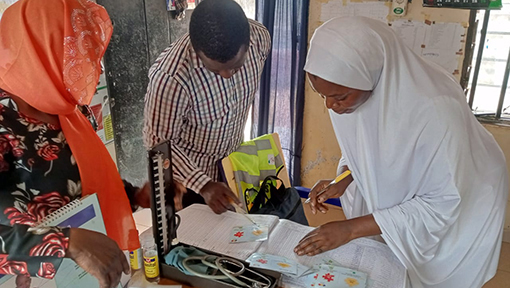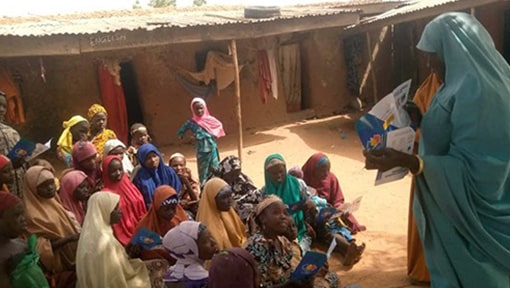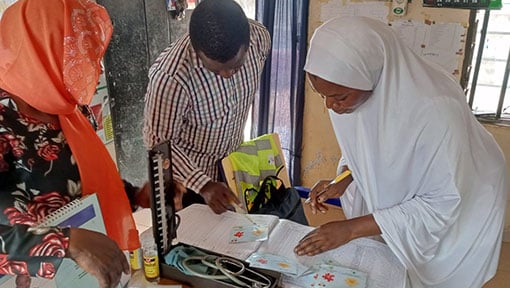Changing the Narrative: How Nyamira County is Tackling Its High Rate of Teenage Pregnancies
Contributors: Nancy Aloo, Njeri Mbugua, Peter Kagwe and Kirole Ruto

Melen (center with child) meets with Bosibori, a community health volunteer in Nyamira County.
Melen and her mother know all too well the struggle of raising children single-handedly. When Melen’s mother was young, she had three children, but sadly, her husband left her soon thereafter. And Melen, just 17 years old, is now the mother of two children.
Melen lives with her mother in Nyamira – a county in Kenya with a high rate of adolescent pregnancies (28% compared to the national average of 18%). Ministry of Health (MOH) reports indicate that of the 18,203 pregnant women coming in for their first antenatal care visit in 2020 in Nyamira county, about 5,400 were adolescent girls.
Adolescent pregnancy rates are usually higher in communities affected by poverty and a lack of employment opportunities. Once they give birth, the young women have to take the role of being both students and mothers at the same time. Melen explains the challenge of this dual role:
My mother supported me when I had my child. When my second child came, I had to drop out of school as my mother could not fend for us all. I started doing menial jobs to supplement our income.”
Various studies have shown that teen mothers are less likely to complete secondary school education when compared with teens from similar backgrounds who do not give birth. These teen mothers often lack adequate job skills, making it hard for them to find and keep a job. The alternative is for them to depend on their family or relatives for assistance, creating a vicious cycle of poverty.
Research has also shown that most of these unintended pregnancies can be prevented, which is essential for improving adolescents’ sexual and reproductive health and their social and economic well-being. Nyamira’s MOH is working to enhance access to quality reproductive health information and services for adolescents and youth.
With The Challenge Initiative (TCI)’s support, the MOH in Nyamira is strengthening the capacity of health providers to serve young people like Melen. TCI also supports community structures by working with community health volunteers (CHVs) to reach out to communities and create awareness about the availability of services specifically for young people. Community dialogues are also conducted to share knowledge about contraceptive services for young people while creating an enabling environment in the community related to the benefits of contraceptives and demystifying the myths and misconceptions around young people’s use of contraceptives.
Since TCI began its engagement with Nyamira two years ago, more than 200 health providers have been trained in the provision of quality adolescent and youth friendly health services (AYFHS). These skilled providers and the health facilities in which they work are also bringing these services to previously underserved communities through integrated outreaches and in-reaches. Also, to ensure a continuum of care, about 100 CHVs have been sensitized on AYFHS and are able to counsel and refer young people to the youth-friendly facilities.
Bosibori is one of the CHVs who benefited from this collaboration with TCI. Previously, she provided health sanitation information to the households she visited. However, while making her household visits, she noted that there was a teen mother or young pregnant girl at nearly every household. But she was uncertain as to how best to discuss family planning with them, given the misinformation surrounding it in the community.
After receiving training and coaching on family planning and AYFHS, she immediately established forums where young mothers would meet regularly and discuss their well-being. In addition, Bosibori revived the community health dialogues and ensured that even the men participated. Bosibori shared proudly:
The community dialogues are working. Previously, the [pregnant] girls could not go back to school. But now, teachers openly welcome them back. More parents are willing to take care of their grandchildren while the girls go back to school.”
When Melen wanted to get contraceptive services, she reached out to Bosibori. They talked about the methods available and Melen was able to get answers to her questions. Initially, Melen was averse to contraception, having been told that it ‘spoils’ a girl’s body and if she used it, she would never be able to bear children again. Melen explained how this misinformation and fear can lead young girls like her to not take up contraceptive services, preventing them from being able to determine their futures where they have greater educational and career opportunities, and perpetuating the cycle of poverty.
Bosibori counseled her and even escorted her to the hospital. She also regularly visits her at her home to see how Melen is responding to the contraceptive she chose. Bosibori is able to visit many more teenage mothers and provide them with information and resources to help them as well as ensure their babies grow and thrive by educating families on the importance of exclusive breastfeeding, taking children to the clinic for immunizations, advice on nutrition and even income-generating activities.
The county of Nyamira is now succeeding in reducing unintended pregnancies and, in the process, boosting the education and economic prospects of young women. Melen is in the process of enrolling in a tailoring school where she will learn basic skills in dressmaking with the hope that she will be able to make enough money to take care of her two children. She shared:
This was my first time using contraception. I am still healthy and now I will be able to start my life again. I previously thought my life was over. Now, I feel like I will be the best dressmaker in this village.”
Learn more about Melen’s story in this video.
Meanwhile, in another part of Nyamira county, a teacher who participated in a community dialogue is championing parents and guardians to take their girls back to school after giving birth. Everlyne shared why she is so passionate about this issue:
I was a teen mother myself, and I can relate to the struggles of many girls who fall pregnant while still in school. Despite the return to school policy by the government after child birth, I also faced the stigma from teachers to those living around us.”
Everlyne was able to go back to school, complete her education with support from relatives and graduate from college. She is now a teacher in one of the local secondary schools and also conducts routine home visits to talk to young pregnant girls and their mothers. She explained:
We talk to the parents or guardians on providing support to the girl while allowing her to go back to school and complete her studies.”
Nyamira county is beginning to actualize the African proverb, “It takes a village to raise a child”, with the community coming together to support teenage mothers in completing their education, reaching their dreams and enabling them to take better care of their young children.






